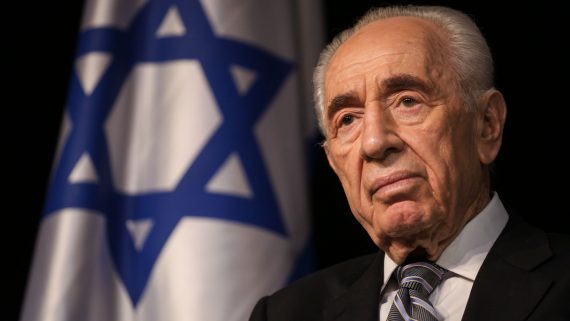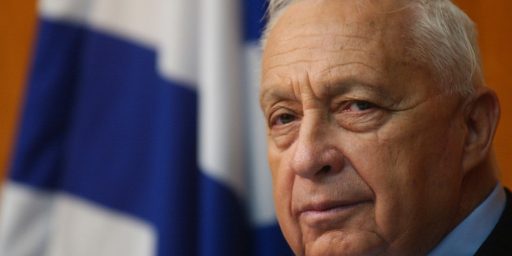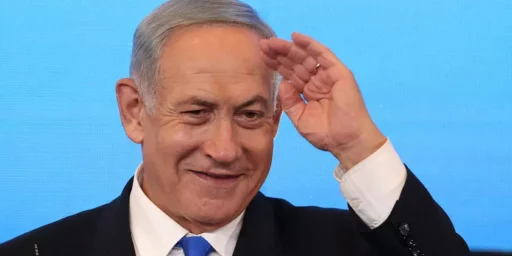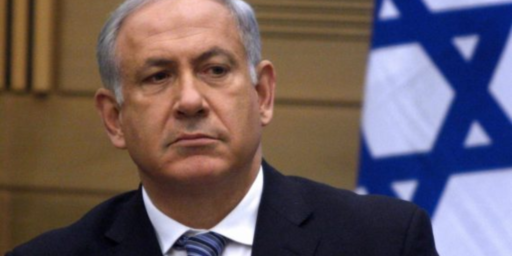Former Israeli Prime Minister And President Shimon Peres Dies At 93
One of the last survivors of Israel's founding generation has passed away.
Shimon Peres, one of the last surviving members of Israel’s founding generation who during his long career served as the nation’s Defense Minister, Minister of Foreign Affairs, Prime Minister, and President, has died at 93:
Shimon Peres, one of the last surviving pillars of Israel’s founding generation, who did more than anyone to build up his country’s formidable military might, then worked as hard to establish a lasting peace with Israel’s Arab neighbors, died on Wednesday in a Tel Aviv area hospital. He was 93.
His death was announced by his son Nehemya Peres, who is known as Chemi, and his personal physician and son-in-law Dr. Rafi Walden, outside the Sheba Medical Center, where he had been hospitalized for the last two weeks.
Mr. Peres died just over two weeks after suffering a stroke. Doctors kept him largely unconscious and on a breathing tube since then in hopes that it would give his brain a chance to heal. But he deteriorated as the nation he once led watched his last battle play out publicly and leaders from around the world sent wishes for his recovery.
As prime minister (twice); as minister of defense, foreign affairs, finance and transportation; and, until 2014, as president, Mr. Peres never left the public stage during Israel’s seven decades.
He led the creation of Israel’s defense industry, negotiated key arms deals with France and Germany and was the prime mover behind the development of Israel’s nuclear weapons. But he was consistent in his search for an accommodation with the Arab world, a search that in recent years left him orphaned as Israeli society lost interest, especially after the upheavals of the 2011 Arab Spring led to tumult on its borders.
Chosen by Parliament in 2007 to serve a seven-year term as president, Mr. Peres had complicated relations with the hawkish government of Prime Minister Benjamin Netanyahu, elected in 2009. While largely a ceremonial post, the presidency afforded Mr. Peres a perch with access and public attention, and he tried to exert his influence.
For someone who was dogged for decades by a reputation for vanity and back-room dealing, Mr. Peres ended his years in public office as a remarkably beloved figure, promoting the country’s high-tech prowess and cultural reach, a founding pioneer who set an example for forward thinking.
Never at a loss for a bon mot in his Polish-accented Hebrew, English and French, Mr. Peres said of his transformation: “For 60 years, I was the most controversial figure in the country, and suddenly I’m the most popular man in the land. Truth be told, I don’t know when I was happier, then or now.”
(…)
He was born Shimon Persky on Aug. 16, 1923, in the small village of Vishniewa, Poland, to a merchant family. His parents, Yitzhak and Sara Persky, took him to Palestine when he was 11, where he studied in Tel Aviv and then entered an agricultural school.
In 1941, he helped found Kibbutz Alumot in the eastern Lower Galilee, where he worked as a herdsman and was elected kibbutz secretary. He soon became active in the Mapai, which was to become Israel’s Labor Party, and, at 18, was appointed the coordinator of the youth movement of the Histadrut, the General Labor Federation.
He rose rapidly, getting experience in the intricacies of Israeli political life. In 1944, Ben-Gurion, then the head of the Jewish Agency for Palestine, sent Mr. Peres with a small reconnaissance group to Eilat on the Red Sea to survey the Sinai Desert and make maps that became important strategic assets during the 1948 war of independence.
It was on that mission that a friend sighted a nest of eagles, “peres” in Hebrew. “Persky,” he said, “why don’t you change your family name to Peres?” He accepted the suggestion, though, in fact, the bird they saw was more a vulture than an eagle.
When Israel became independent in 1948, Mr. Peres was named head of the naval service. Within two years, he was sent to the United States to lead a defense supply mission in New York. He was 27 and spoke no English, but within three months, after rounds of intensive private lessons, he was fluent. He took courses at the New School for Social Research and New York University, and later at the Harvard School of Public Administration.
In 1951, Ben-Gurion, then prime minister and minister of defense, appointed Mr. Peres director general of the Defense Ministry, where he used his Harvard training to reorganize the department. Mr. Peres became known as one of “Ben-Gurion’s boys” — protégés of the “Old Man” — a group that included Teddy Kollek and Moshe Dayan.
Those years may have been the genesis of a lifelong rivalry with Mr. Rabin, who at the time was chief of the operations branch, the second-highest position in the Israeli Army, and who complained of what he called Mr. Peres’s excessive authority.
At the Defense Ministry, Mr. Peres was in charge of a substantial portion of the nation’s total budget, and he played a central role in developing the young nation’s industry, particularly in aeronautics and electronics.
He stressed domestic weapons production, but when Egypt received advanced military equipment from the Soviet Union and Czechoslovakia, Mr. Peres began to cast about for new sources of supply. He finally turned to France.
His timing was excellent. The French believed the Algerian revolutionaries fighting for independence were fueled by President Gamal Abdel Nasser of Egypt and saw Israel as a source of intelligence about Egypt. Mr. Peres negotiated a $1 billion arms deal and acquired a reputation as a canny bargainer.
The arms negotiations formed a basis for the Franco-Israeli alliance that led to Israel’s lightning capture of Sinai during the Arab-Israeli War in 1967. Zeev Schiff, for many years the military editor of the newspaper Haaretz, said, “There is no doubt that Peres was one of the brains behind Suez.”
Ben-Gurion felt that a pre-emptive war was bad for Israel in terms of public opinion and was reluctant until the last. Mr. Peres saw it as an opportunity to get a better position among the superpowers, a special relationship through a “joint venture of going to war together.”
Out of that joint venture came French help in building a nuclear reactor in Dimona, which provided Israel with the ability to build nuclear weapons.
“I reached the stage in France where I was trusted by everybody, and really the sky was the limit,” Mr. Peres said many years later.
(….)
Mr. Peres became prime minister at the head of an unusual coalition of Israel’s two major political parties, his own Labor Party, and the Likud, the party led by Yitzhak Shamir, who served as deputy prime minister and foreign minister. In accordance with the coalition agreement, the two men exchanged posts after 25 months.
Mr. Peres brought a period of tranquillity to the social environment, which had been frayed by animosities between European and Middle Eastern Jews and between religious Jews and secular Jews.
He presided over the withdrawal of Israeli forces from Lebanon after an invasion that had generated unprecedented controversy, and he became the first Israeli prime minister to take the difficult steps required to deal with the nation’s fundamental economic problems and ruinous inflation.
During his time in office, Israel airlifted some 7,000 Ethiopian Jews who had trekked to refugee camps in Sudan to escape famine, anti-Semitism, forced conscription of boys and other threats that made their lives in Ethiopia precarious. Mr. Peres called the clandestine rescue operation a “daring and wonderful” act of “self-redemption.”
Taking over what was expected to be a government of national impasse, Mr. Peres left office with an image as a dignified, self-confident statesman.
But while he was prime minister, severe strains developed in relations between the United States and Israel growing out of a major spy scandal involving an American, Jonathan Jay Pollard, and the disclosure in 1986 of Iranian arms deals.
A man of medium height and slender, athletic build — his dark hair turned gray and then white in his later years — Mr. Peres always exuded vitality, despite a schedule that kept him going 18 hours a day. When, on his 88th birthday, he was offered a traditional Jewish greeting, “May you live till 120,” he retorted without missing a beat, “Don’t be stingy.”
The height of Peres’s career, though, when he talked peace with Israel’s mortal enemy:
In his efforts to help Israel find acceptance in a hostile region, Mr. Peres’s biggest breakthrough came in 1993 when he worked out a plan with the Palestine Liberation Organization for self-government in Gaza and in part of the West Bank, both of which were occupied by Israel.
After months of secret negotiation with representatives of the P.L.O., conducted with the help of Norwegian diplomats and intellectuals, Mr. Peres persuaded his old political rival Yitzhak Rabin, then the prime minister, to accept the plan, which became known as the Oslo Accords.
Mr. Peres, who was serving as foreign minister, signed the accords on Sept. 13, 1993, in a ceremony on the South Lawn of the White House as Mr. Rabin and their old enemy Yasir Arafat, the chairman of the P.L.O., looked on and, with some prodding by President Bill Clinton, shook hands.
It was a gesture both unprecedented and historic. Up to that time, Israel had refused to negotiate directly with the P.L.O. Mr. Peres broke the taboo, and the impasse.
“What we are doing today is more than signing an agreement; it is a revolution,” he said at the ceremony. “Yesterday a dream, today a commitment.”
“We are sincere,” he pledged to the Palestinians. “We mean business. We do not seek to shape your lives or determine your destiny. Let all of us turn from bullets to ballots, from guns to shovels.”
Later that day, in a television interview, Mr. Peres pronounced himself 100 percent sure that peace had arrived. With the changes in the world — the end of the Cold War; the collapse of the Soviet Union and, with it, its military, financial and diplomatic support of the P.L.O.; and the drying up of funds from Arab countries angered over Arafat’s support of Iraq in the recent Persian Gulf war — the time had come for the Palestinians, too, to seek peace.
“If you have children,” he said, “you cannot feed them forever with flags for breakfast and cartridges for lunch. You need something more substantial. Unless you educate your children and spend less money on conflicts, unless you develop your science, technology and industry, you don’t have a future.”
Mr. Peres, Mr. Rabin and Arafat were awarded the Nobel Peace Prize in 1994.
But the era of good feelings did not last. Barely a year later, Mr. Rabin was assassinated by a Jewish gunman upset by the accords, elevating Mr. Peres to the post of prime minister. A series of Palestinian suicide bombings undercut Mr. Peres’s authority, and he lost a narrow election to Mr. Netanyahu in 1996.
Conflict between Israel and the Palestinians accelerated in 2000 after a visit by the opposition leader Ariel Sharon to the sacred plaza in Jerusalem known to Jews as the Temple Mount and to Muslims as the Noble Sanctuary. The next day, the Israeli police fired on stone-throwing protesters, inaugurating a new round of violence that became known as the second intifada.
It did not end until Arafat died in 2004, bringing new leadership to the Palestinians and a new effort at coexistence led by Mr. Sharon, a former hawk who was elected prime minister and withdrew Israeli settlers and soldiers from Gaza and small parts of the West Bank.
Mr. Peres had tried before to get a peace settlement, in 1987, at that time between Israel and Jordan. He was foreign minister in a coalition government with Yitzhak Shamir when he proposed an international peace conference on the Middle East. But Mr. Shamir and his Likud faction scuttled the plan.
Mr. Peres had sought to settle the future of the West Bank and Gaza, which Israel had occupied since the Arab-Israeli War in 1967. As a first step, he proposed that Jordan and Israel could either divide the land or share the government but that Israel should not control the area forever.
The advances toward peace that Peres helped forge have been tested many times, most especially by terrorist elements such as Hamas that have never accepted the existence of Israel as an independent nation, and despite many setbacks have largely held together in no small part because both sides seem to recognize that peace is better than war. Even that realization, though, hasn’t been enough to persuade either side of the necessity of a final agreement that will secure a peaceful future for Israel and Palestine alike. Until that happens, the peace that Peres helped to forge will always be in danger of falling apart.







An amazing, complicated, impactful man and life. z”l
Poor Israel. Founded by giants, now reduced to Lilliputians like Bibi.
He never got to see peace in the middle east I wonder if anyone alive now will.
As an American Jew who believes in more centrist and progressive politics for Israel, Shimon Peres, always the best hope of the centrists and liberals to bring Israeli politics forward. However, many security threats to tiny Israel often made Israeli voters seek the protections of hardliners such as Netanyahu, who have often presented compromise obstructions to peace agreements when those windows may have been open a crack. Yet, strangely Israel’s position with Saudi Arabia, Egypt and Jordan are growing stronger with the shared threat of Iran, while both Hamas and the Palestinian Authority both support terrorism within Israel to greater or lesser extents, rather than a true commitment to peace. Netanyahu would go forward with a peace with the two fractured Palestinian political elements if only they would agree to reasonable conditions, but instead we see both Palestinian elements supporting “ethnic cleasing” of Jews from their areas of control and other examples of extreme prejudice against Jews and an unwilling nature to accept Netanyahu’s overatures towards peace.
Iran offering $9000 to terrorists who murder Israeli children, and the Palestinian Authority praise and support for those that murder Israeli children make peace with these elements impossible at this time.
Hmm…”reasonable conditions” like allowing Israeli settlements to continue to gobble up the West Bank…
@An Interested Party: No, reasonable such as simply supporting Israel’s right to exist. Reasonable such as stopping encouragements to terrorism or offering young Palestinian men up to $9,000 in cash payments to kill Israelis with knives or a motor vehicle if a gun is not available. Israel would be more than happy to suspend any new settlements in the name of peace as well as other reasonable concessions.
Oh really? When has Israel ever shown an interest in stopping settlements in the West Bank? No one can excuse the terrorism from the Palestinians as well as others in the region but none of that should be used as an excuse by Israel to continue to gobble up the West Bank…I’m not quite sure how Netanyahu and his ilk ever hope to achieve peace when land grabs seem more important…